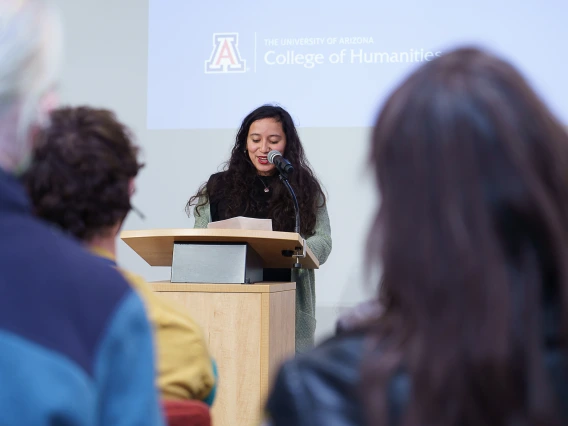
With a deep commitment to literary arts and languages and world-renowned experts and literary translators among the faculty, the College of Humanities was a natural partner for the American Literary Translators Association.
ALTA was founded in 1978 and in 2019 moved to the University of Arizona, where 19 faculty affiliates are joined in the effort to advocate for bold, diverse approaches to literary translation and multilingual arts in research, teaching and public life. During the first four years of the partnership, numerous collaborations have been launched, despite the pandemic’s turmoil, creating a foundation that both sides are excited to build on over the next four years.
ALTA has collaborated with 19 faculty members across 11 departments, programs and centers. Collaborations have included class visits, career talks for students, supporting faculty in funding applications, and public talks, exhibitions, and performances, said Executive Director Elisabeth Jaquette, herself a translator from Arabic. The 2022 Tucson Humanities Festival featured a reading from more than a dozen participants in ALTA's Emerging Translator Mentorship Program.
“One reason that ALTA has found such a productive and engaged home at COH is whether we think about it or not, translation is the lifeblood of so many of the departments. When students are reading Russian literature or studying Italian film, translation is what happens behind the scenes to make those works available to students. Even language learning in the beginning stages is really translation,” Jaquette said. “We’re excited to see the seeds of collaboration really blossom over the next four years. We’ve been able to make connections with faculty and students across departments and those are starting to flourish.”
For Colleen Lucey, Assistant Professor of Russian and Slavic Studies, having ALTA housed at the University of Arizona is a major asset, both as a classroom instructor and a researcher.
“ALTA fits uniquely with the College of Humanities because it promotes a humanistic world view that celebrates the different perspectives of languages and cultures,” Lucey said. “It’s imperative for those of us who work in languages that are often taught in translation to discover the texts that will speak to the 21st century and translate those for new audiences.”
Lucey, who represents the College of Humanities on ALTA’s board of directors, said she uses translation activities in her language classes to build second-language skills, but that translation is also a huge component of cultural classes. The Russian literary greats of the 19th century have long been translated into English, but more recent translations are introducing the perspectives of women writers and those from marginalized ethnic communities.
“ALTA is such a phenomenal organization at highlighting the interdisciplinarity of translation scholarship in the 21st century. ALTA promotes new translations and makes it meaningful in the age of Google translate. You cannot Google translate poetry in a way that does justice to the work,” she said. “Discovering the power of language allows students to own and be excited about that. That’s a necessary and rewarding part of the humanities.”
Janice McGregor, Assistant Professor of German Studies, has invited ALTA into her classroom, giving both graduate and undergraduate students in her Task of the Translator course new insights into translation and related career opportunities.
“Students in the course also attended ALTA talks or volunteered at ALTA’s annual conference, and were excited to bring their ideas back to classroom discussions. They were fascinated by topics like multilingual writing in translation, translator visibility, and learning about publishing and professional processes around translation,” she said.
“As a scholar of multilingualism, I’m always thinking about how languages shape who we are, how we write, read, and interpret our experiences, as well as whose texts, tongues, and voices are made available and accessible, and to what audience,” said McGregor, who is also co-editor of the journal Critical Multilingualism Studies.
Kelsi Vanada, ALTA Program Manager and a poet and translator, said the partnership comes at a time of increasing popularity of translated literature in the United States and significant growth for ALTA itself, which has grown to more than 800 members.
“In the past five or 10 years, translation has had a big flourishing in the United States,” Vanada said. “In the next 10 years we’re going to be experiencing more voices from the periphery and the margins. We’ll see that vibrant new cohort start to publish and bring in works that we might not even know we were missing in English.”

